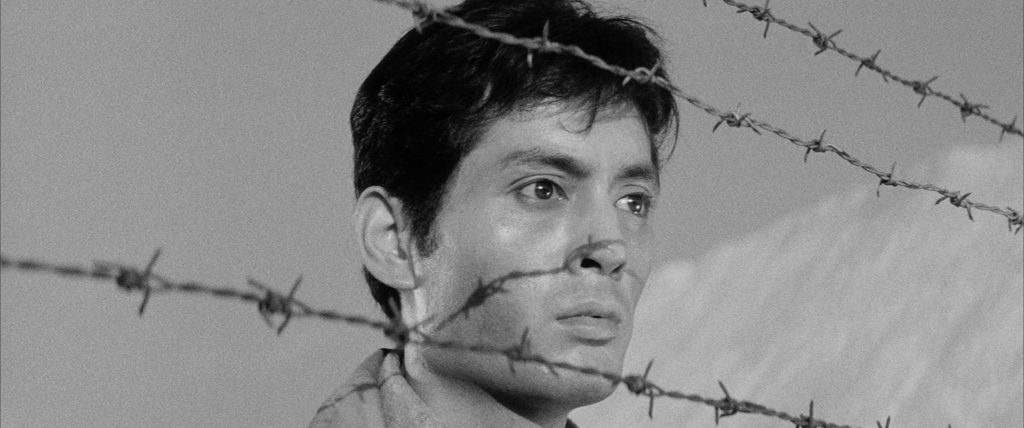With attention spans at an all-time low, modern filmmakers have to be especially cognizant of the pacing of their films if they want their material to resonate with a wider audience. Earlier this year, a viewing of the colossal-length Sátántangó conjured up an internal debate over when a film justifies a lengthy runtime. While that film is quite rewarding for those who lose themselves in the rhythms, it is very isolating to those who view film through a more casual lens. It is this aspect that makes the Masaki Kobayashi (Hari-Kiri) epic The Human Condition such an intriguing prospect. While the film clocks in at two hours longer than Sátántangó at over nine-and-a-half hours long, the narrative within is so universally understandable and enthralling that most who give it a shot are bound to fall in love with the journey, or at the very least admire what is accomplished.
At a time when public opposition to Japan’s wartime efforts was tantamount to being a traitor, it is a minor miracle that Kobayashi was able to get this film made. Based on the six-volume novel of the same name published by Junpei Gomikawa, The Human Condition is an autobiographical tale that explores the basic question of how one exists in a society that they feel is corrupted without becoming corrupt yourself. While not the author of the book, Kobayashi felt as if he could have been due to the similarities in his own life, which is what pushed him to threaten quitting his home studio at Shochiku if he could not make this tale. Released in three parts from 1959 to 1961, the trilogy of films does the daring task of placing blame on the corrupt system of government for any failings rather than the individual. Over these six parts we see how one individual can go from a wide-eyed humanist to a disillusioned man filled with contempt for the world around him which never matches up to what he expects from it.

Tatsuya Nakadai gives the performance of a lifetime as Kaji, a young left-wing worker in Japan who begins our story reluctant to marry his girlfriend Michiko (Michiyo Aratama) for fear that he will be called up to join the war at any moment. The idealistic Kaji is given a golden opportunity from his company to gain exemption from joining the military in exchange for taking a job as the head of personnel at a mining camp in the Japanese-colonized Manchuria. Kaji has some radical ideas about treating workers more humanely that the company is interested in testing out. Although positioned as a man of great moral fortitude, this simple act of accepting a position in a corrupt system to save his own skin is but the first step in a journey to unknown depths. With Michiko in tow as his new bride, the two travel to the mining operation where Kaji is faced with opposition from various sides. The supervisors who work there think his methods are weak and ineffective, while the Chinese workers view him as a “Japanese devil” like all the rest.
One of the fascinating bits about this story is the way it repeats in tragic but satisfying ways – just like real life. Kaji approaches every situation he is in with the best intentions, but almost every time something happens that makes his efforts a detriment to himself and others. For trying to prevent the execution of Chinese prisoners, he gets branded as a “Red sympathizer” and his exemption is revoked while the Chinese prisoners get a bigger target on their back where the Japanese can regain their honor. Kaji refuses to believe he is participating in a corrupt system which only leads him to darker paths. At first he is a man who is haunted by slapping an individual in the face, but by the time life has raked him over the coals he will consider what he thinks is “justifiable” homicide. Time after time his idealistic views are shattered in increasingly heart-wrenching ways until there is nothing left for him to believe in.
Throughout the nearly ten-hour runtime, there is nary a moment that Tatsuya Nakadai is not on screen delivering one of the finest performances we have ever seen. There is such an evolution from his time at the top at the mining company until his ultimate reversal of fortune as a POW. The time allotted by the structure of this narrative allows this change in ideals to flourish and turn naturally as the world corrupts him. The character is an empathetic one that you want to succeed even with his numerous shortcomings. He is especially aided in this by the scenes with Michiko that offer some tenderness in this bleak mosaic. Masaki Kobayashi does not pull any punches when it comes to executing his vision, but every decision he makes brings a pulsating energy to the story that makes every hour fly by until you find yourself emotionally wrecked by the end and wondering where all the time went. The Human Condition tells you exactly what you are getting into with its title, but the full range of what exactly that means cannot be understood until you have immersed yourself in this tale of moral decline. It is one of the most fulfilling sagas ever committed to film.

Video Quality
The Human Condition comes to Blu-Ray in North America courtesy of The Criterion Collection sourced from the high definition restoration undertaken by Shochiku in the original 2.39:1. The beautiful black-and-white photography wows in high definition with natural grain intact. The grain field resolves well consistently throughout the six chapters. The contrast is well defined and print damage has been cleaned up immensely with only a few stray nicks and scratches. There is an incredible amount of detail present with nice texture on the costumes and in the gritty production design. There are various moments where prisoners are caked with mud and grime that presents with an impressive texture. Black levels are wonderfully deep with no distracting trace of black crush or compression artifacts. Even with three-plus hours of movie plus supplemental features per disc, these discs hold up well in regards to space limitations. White levels also show no hint of blooming at any point. The Criterion Collection has done a stellar job with this transfer in all respects.
Audio Quality
This Blu-Ray set comes with an LPCM 1.0 mono track for Parts 1-4 (Disc One and Two) and a DTS-HD 4.0 Master Audio track for Parts 5-6 (Disc Three), all in the original Japanese, Mandarin and Russian (with optional English subtitles). Dialogue sounds perfectly clear without sound effects or the score trouncing on important information. Every sonic element is delineated precisely so everything maintains its own identity. The latter part of the narrative employs some powerful sound effects in the form of gunfire and roaring engines from tanks that are given the appropriate weight within the mix. The deeply affecting score comes through nicely in relation to the competing sounds. Never does the music present as sharp or overbearing. For a large portion of the runtime this is a pretty restrained presentation, but the conclusion of the saga opens up some channels quite nicely. This is a track that presents everything accurately with pleasing fidelity and without damage or other unwanted issues.

Special Features
The Criterion Blu-Ray of The Human Condition includes a foldout booklet featuring the 2009 essay “The Prisoner” by film historian Philip Kemp in which he discusses the themes and cultural significance of the picture, the career of Masaki Kobayashi and much more. This provides a great amount of context and insight into the film that is so worthwhile. The on-disc special features are as follows:
- Masaki Kobayashi: A 14-minute conversation conducted in 1993 for the Directors Guild of Japan in which director Masaki Kobayashi discusses The Human Condition with fellow filmmaker Masahiro Shinoda. The two discuss the personal nature of the story, the five years it took to produce the feature, capturing the perfect image on screen, his reflections on the grueling production, the tight post-production schedule, how he learned to work with his cinematographer, the work of other notable auteurs and more. It is always worthwhile to hear directly from the mind of the director.
- Masahiro Shinoda: A 25-minute interview with filmmaker Masahiro Shinoda conducted in 2009 in which he shares his impressions of The Human Condition and Masaki Kobayashi as a director. There is discussion about Kobayashi’s indifference to the typical studio schedule, his history in the military, the role of idealism in the narrative, the doubt that occupied his mind after interacting with POWs, the even-handed nature of the presentation and much more.
- Tatsuya Nakadai: An 18-minute conversation with the lead actor (Kaji) conducted in 2009 in which he discusses the importance of the role, getting an opportunity to inhibit the character, the process of scouting locations, the massive undertaking of production, how he looked towards Kobayashi for inspiration, filming the final scene and much more. This is an extremely worthwhile supplement that all fans should seek out.
- Trailer #1: A four-and-a-half minute trailer is provided which plays up the epic nature of the first two parts of the story.
- Trailer #2: A nearly three-minute trailer is provided for the third and fourth parts of the story.
- Trailer #3: A three-minute trailer which plays up the conclusion of the saga in parts five and six.
Final Thoughts
The Human Condition is a staggering piece of cinema that ranks among the most affecting narratives put to screen. The film is not just notable for its epic running time, but what it accomplishes within that running time that taps into something so elementally visceral. The lead performance from Tatsuya Nakadai is a true wonder as he taps into something so special over these six parts. The Criterion Collection has released a three-disc Blu-Ray set that features a fantastic A/V presentation and a pleasing assortment of supplemental features. This is the type of undertaking that deserves a place on the shelf of any serious cinephile. Highly Recommended
The Criterion Collection edition of The Human Condition is currently available to purchase on Blu-Ray and DVD.
Note: Images presented in this review are not reflective of the image quality of the Blu-Ray.
Disclaimer: The Criterion Collection has supplied a copy of this disc free of charge for review purposes. All opinions in this review are the honest reactions of the author.

Dillon is most comfortable sitting around in a theatre all day watching both big budget and independent movies.







